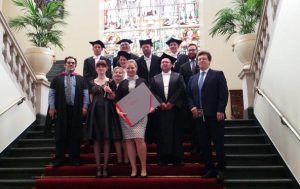Defense Magda Grudniewska-Lawton
On Wednesday, the 6th of September, Magda Grudniewska-Lawton successfully defended her PhD thesis, entitled “The flatworm puzzle. Uncovering the molecular basis of the remarkable resilience and regeneration capacity of Macrostomum lignano.”
Thesis summary:
Model organisms are essential for biomedical research. A small selection of established models is commonly used, and during the last decade several additional models have been developed. This thesis presents the establishment of such a novel model: the free-living flatworm Macrostomum lignano. This animal is largely known for its astonishing regeneration capacity. An amputated head can regrow a complete body, including reproductive organs, in 3 weeks! This is possible thanks to the neoblasts: cells which can divide and form new cells needed to replace damaged or missing ones. To study how these cells work, we established a genome and transcriptome of the worm and characterized the genes enriched in neoblasts and cells of reproductive organs. Part of these genes are specific for flatworms, but others are conserved in other animals and humans. Here, we investigated the function of a selection of genes of both groups. The transcriptome also allowed to study other interesting characteristics of M. lignano, such as its long lifespan and resistance to ionizing irradiation. For example, we characterized the ageing profile and investigated why this animal can live multiple years. We tested which dose of irradiation the worms can survive and described how genes change their expression level after ionizing irradiation. By studying different questions and developing techniques for this, we made an important step in the establishment of M. lignano as a novel model organism. The generated resources will be valuable, not only for research on M. lignano, but also for other flatworms and biomedical research in general.






